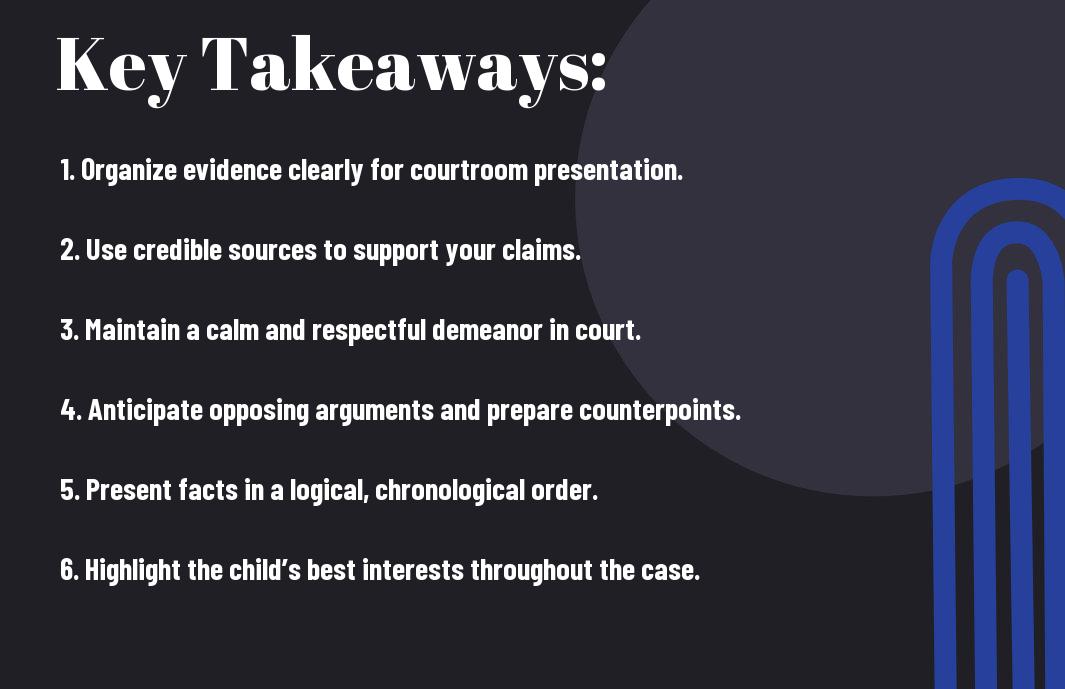There’s a significant challenge when it comes to presenting evidence in custody court, and understanding effective strategies can make a difference in your case. As you navigate this emotional journey, knowing how to organize and present your evidence is necessary for demonstrating your commitment to your child’s best interests. This post will guide you through proven tactics to enhance your presentation skills, ensure your evidence is impactful, and ultimately increase your chances of a favorable outcome in court. Digital Forensic Squad will assist you with collating the evidences for strengthening your custody case.
Key Takeaways:
- Organize evidence effectively, presenting it in a clear and logical manner to support your case.
- Utilize professional documentation and witness testimonies to strengthen your credibility in court.
- Be prepared for cross-examination by anticipating questions and rehearsing your responses thoroughly.
Understanding Custody Court
The custody court is a specialized judicial forum where decisions are made regarding the care, control, and companionship of children following a separation or divorce. Understanding its workings, procedures, and legal standards is crucial for any parent involved in a custody dispute, as it directly impacts your child’s future and your parental rights.
Overview of Custody Proceedings
Proceedings in custody cases involve several steps, including initial filings, mediation, hearings, and potentially a trial. Each stage is designed to assess the best interests of the child, allowing you to present your case, gather evidence, and engage with legal professionals throughout the process. Familiarity with these steps can significantly enhance your chances of a favorable outcome.
The Role of Evidence in Custody Cases
Custody cases heavily rely on evidence to establish the parenting capabilities of each party. This evidence can include documents, witness testimonies, and expert evaluations that illustrate your involvement in your child’s life or any concerns regarding the other parent’s fitness.
Consequently, the evidence you present can play a significant role in shaping the court’s opinion about your parenting ability. Strong evidence such as documentation of your involvement in your child’s education, health, and daily activities, along with witness statements from family or friends, can positively influence the judge. Conversely, any negative evidence regarding the other parent’s behavior or substance abuse issues can highlight potential risks to your child’s well-being, thereby supporting your case for custody.

Types of Evidence
Assuming you understand the different types of evidence that can significantly impact your custody case, here are the main categories to consider:
| Documentary Evidence | Includes reports, emails, and other written forms. |
| Physical Evidence | Tangible items that support your claims. |
| Testimonial Evidence | Statements from witnesses regarding child custody. |
| Character Evidence | Information about your character and parenting skills. |
| Expert Witnesses | Professionals who can provide insights into custody matters. |
Perceiving the variety of evidence available empowers you to make informed decisions for your case.
Documentation and Records
At this stage, gathering comprehensive documentation and records can fortify your position in court. This can encompass school records, medical reports, and communication logs, which all provide a factual basis for your claims. Each piece of documentation plays an integral role in establishing your capabilities and dedication as a parent.
Witness Testimonies
For effective custody presentations, leveraging witness testimonies can be key. You should consider friends, family, or professionals who have observed your parenting and can attest to your relationship with your child. This personal insight can help humanize your case.
But securing witness testimonies requires strategic planning. You want individuals who genuinely know you and can speak positively about your parenting abilities. Potential witnesses might include teachers, counselors, or family friends who have seen your interactions with your child. Ensure they are aware of the importance of their testimony, as their perspectives provide valuable, first-hand accounts that can significantly influence a judge’s decision.

Preparing Your Evidence
Your success in custody court largely depends on how well you prepare your evidence. This preparation not only involves gathering necessary documents but also presenting them effectively. By taking the time to prepare, you can significantly influence the outcome of your case and ensure that your side of the story is compelling and clear.
Organizing Documents
With a plethora of documents at your disposal, effective organization is key. Begin by sorting your materials into categories – such as parenting plans, communication records, and witness statements – to streamline your presentation. Also, create a chronological timeline for events relevant to your case. This structured setup not only aids your understanding but also facilitates easier reference during the court proceedings.
Practicing Presentation Skills
Preparing to present your evidence effectively is as important as gathering it. To ensure your facts resonate, practice your presentation skills repeatedly. This includes rehearsing your statements, maintaining eye contact, and using clear and assertive language. Familiarity with your materials will boost your confidence and help you convey your points convincingly.
Further, engaging in mock presentations can provide valuable insights into your delivery style. Whether it’s in front of friends or family, seek constructive feedback on your pacing, clarity, and emotional tone. This practice not only polishes your speaking abilities but also helps highlight potential weak points in your argument, providing a chance to adjust your approach. Ultimately, a confident and well-practiced presentation can make a lasting positive impression on the court.
Strategies for Presenting Evidence
Despite the emotional intensity of custody cases, developing effective strategies for presenting evidence can significantly influence the outcome. Positioning your evidence to align with your parenting goals and the best interests of the child is necessary. Utilizing a well-organized presentation and maintaining focus on relevant facts will help reinforce your position in court.
Effective Communication Techniques
Above all, clear and persuasive communication is vital in custody court. You should articulate your points succinctly and confidently, ensuring that your evidence is easily understood. Establishing a professional demeanor, maintaining eye contact, and using appropriate body language can enhance your credibility and make a positive impression on the judge.
Anticipating Counterarguments
After preparing your evidence, it’s important to anticipate potential counterarguments from the opposing party. By understanding their perspective, you can bolster your own case and address weaknesses in advance, demonstrating your preparedness and commitment to the child’s well-being.
Counterarguments are often a significant component of custody hearings, so it is important to anticipate them before your court date. Identify possible objections that may arise regarding your evidence or parenting choices. Developing counterpoints will allow you to respond effectively and highlight your strengths. Additionally, be prepared to provide supporting documentation or witness testimony that reinforces your position. This proactive approach will not only safeguard your case but also help to convey your understanding of the complexities involved, portraying you as a responsible and engaged parent.
Navigating Courtroom Procedures
To successfully navigate courtroom procedures, familiarize yourself with the intricacies of the legal process. Understanding the order of events, from the initial hearing to presenting your case, can significantly impact your outcome. Take advantage of resources like Documentation in Child Custody Cases to prepare effectively. Preparation is key, so practice your presentation and ensure all your evidence is organized and accessible during your court date.
Understanding Courtroom Etiquette
Before entering the courtroom, you should understand the importance of courtroom etiquette. Respectful communication with the judge, avoiding interruptions, and maintaining decorum are vital. Dress appropriately, remain calm, and address everyone in the courtroom courteously. Such conduct will help convey your seriousness about the proceedings and can positively influence perceptions of your case.
Working with Legal Counsel
Working with legal counsel is vital for effectively presenting your case in custody court. Your attorney can provide valuable insight into courtroom procedures, proper documentation, and strategy development.
Navigating the legal landscape is a complex task that requires expertise. Focus on building a strong relationship with your attorney by communicating openly about your goals and concerns. They will guide you in gathering necessary documentation, ensuring all evidence is admissible, and preparing compelling arguments. By collaborating closely, you enhance your chances of achieving a favorable outcome while ensuring your rights are protected throughout the process.
Emotional Considerations
Keep in mind that custody court can be an emotional experience, often heightened by the stakes involved in your child’s well-being. You’re likely to face intense feelings, which can cloud your judgment. Acknowledging these emotions is the first step to manage them effectively. By prioritizing a clear, rational approach, you can present your case more convincingly and make better decisions throughout the proceedings.
Managing Stress and Anxiety
On the day of your court appearance, it’s natural to feel overwhelmed. Implementing relaxation techniques such as deep breathing, meditation, or even a short walk can help keep your anxiety in check. Seek support from friends or a counselor before the hearing, allowing you to express your feelings and prepare your mind for the task ahead.
Staying Focused on the Child’s Best Interests
Interests must remain at the forefront of your strategy. Your child’s well-being guides all decisions, ensuring that emotions do not overshadow what truly matters. During court proceedings, consistently emphasize factors that foster a positive environment for your child—such as stability, safety, and emotional support. This approach not only presents a compelling case but also reinforces your commitment to your child’s welfare.
Due to the nature of custody cases, it’s important to keep your focus directed towards your child’s needs rather than personal grievances. When outlining your case, emphasize aspects that illustrate a loving and secure environment. Highlight stable routines, educational opportunities, and community connections to demonstrate that you are prioritizing their best interests. By clearly articulating how your plans serve your child’s emotional and physical needs, the court can see your dedication and genuine concern, leading to a more favorable outcome.
Final Words
Presently, you are equipped with effective strategies for presenting evidence in custody court, which can significantly impact the outcome of your case. By organizing your evidence meticulously, understanding courtroom decorum, and engaging with your legal team, you can strengthen your position and advocate effectively for your child’s best interests. Trust in your preparation and remain focused on presenting a compelling narrative to support your case. With diligence and clarity, you have the potential to navigate the complexities of custody proceedings successfully.
Q: What types of evidence should I prepare for custody court?
A: When preparing for custody court, it’s important to gather evidence that supports your case for custody arrangements. This may include documentation such as emails and messages that showcase your communication with the other parent, evidence of your involvement in your child’s education, health records, and witness statements from individuals who can attest to your parenting abilities. Financial statements demonstrating your capability to support your child, along with photographs or recordings that provide insight into your child’s daily life and environment, can also be beneficial. The goal is to present a well-rounded view of your role as a parent and the positive impact of your custody proposal on your child’s well-being.
Q: How can I effectively present my evidence in court?
A: Effectively presenting evidence in court requires organization and clarity. Start by categorizing your evidence into relevant sections, such as parenting history, financial stability, and witness testimonies. Create a clear timeline of events that highlights important milestones in your child’s life and your parenting involvement. When presenting your evidence, speak clearly and confidently, referring to specific documents or items to support your statements. It’s also helpful to consider rehearsing your presentation beforehand, so you can anticipate questions from the judge or opposing counsel. Ensuring that all your evidence is accessible and presented in a logical order will help the court understand your case more clearly.
Q: What are some common pitfalls to avoid when presenting evidence in custody court?
A: One common pitfall is not organizing your evidence effectively, which can lead to confusion and disarray during your presentation. Be sure to keep your documents neat and clearly labeled to facilitate easy reference. Additionally, avoid making emotional appeals without supporting evidence, as this can detract from your credibility. It’s also important to remain calm and composed; getting overly emotional can undermine your arguments. Lastly, avoid speaking negatively about the other parent; focus instead on the positive contributions you make to your child’s life and how your proposed arrangements serve their best interests.

